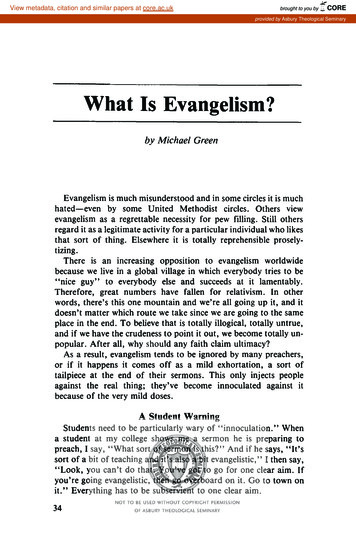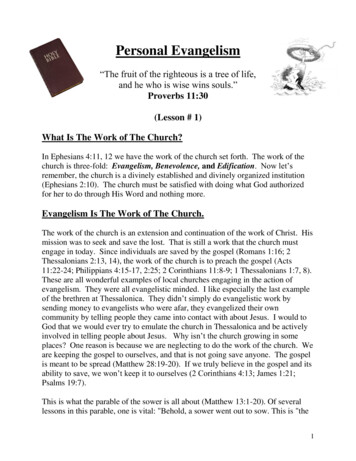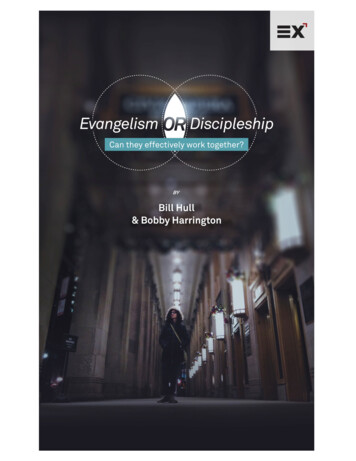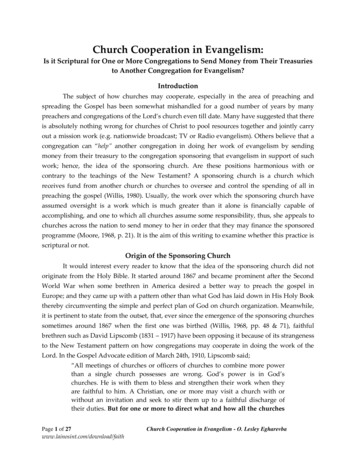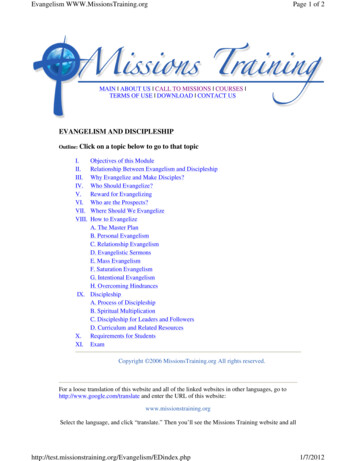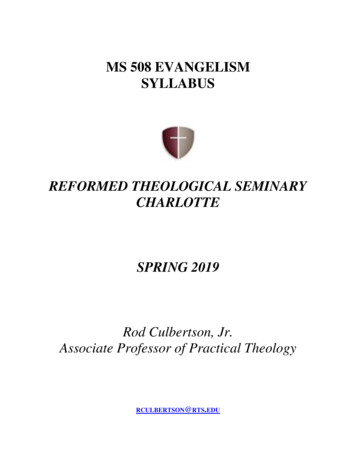
Transcription
The Lamad Book of MissionMaster of Mission & Evangelism DissertationPresented in Part Fulfilment of the “Master of Mission and EvangelismMTh” with Christian Leadership UniversityPost Graduate Tutor: Dr. Mark Virkler (President CLU]Researched and Written by Rev’d Andrew R. HardySubmitted Saturday, 23 February 2008Title: “The Lamad Book of Mission and Evangelism to Secular Un-churched 21st CenturyPeople.”Page1A Revelation Based Approach to Christian Missiology
The Lamad Book of MissionTable of ContentsPagesA Revelation Based Approach to Mission & Evangelism inSecularised Britain, Europe and North America5 – 12Un-churched Parents Re-live their lives through theirChildren13 – 20A Road Test of Ministry to Un-churched ChildrenAnd Youth21 – 33The Missing Factor in Mission to Secular/Un-churchedPeople in 21st Century Britain, Europe and America34 – 405Four Keys to Hear God’s Voice41 – 656Seating Jesus CEO at the Mission Planning Table66 – 767The Threefold Approach to Birthing Mission-al234Vision8Personal Revelation which is leading me to theNext part of the story91077 – 9192 – 102Current Missiology Viewed in the contextsOf Revelation Knowledge103 – 119Win, Build and Equip120 – 13221TitlePageChapter
The Lamad Book of Mission11Two Kingdoms and the mission of Jesus – ourNatural authority in Christ12Seven of the most effective Prayers that Mission-alLeaders ever pray13133 – 138139 – 170Being Flexible as an approach to mission – GodHas infinite ways to express Mission throughChristian Leadership University176177 - 1803Bibliography171 – 175PageAppendixMission-al teams – A Synthesis
The Lamad Book of MissionGlossaryRevelation Knowledge: This means the type of knowledge which is derived through the work of theHoly Spirit through the eyes and ears of the heart. It does not come from a human source, but fromthe Spirit of Christ’ who dwells in the Christian’s spirit.Rhema: This comes from the Greek word [Rhematos] which stands for the spoken word asopposed to the written word [Logos]. In revelation terms this is the word that is used again andagain in the New Testament when speaking of the words of God. It means that when God‟s word isread that we are listening to still speaking words. Rhema also stands for the voice of God which isperceived as spontaneous thoughts or ideas which light upon our minds when the Holy Spiritcommunicates with us through our hearts.Lamad: is a Hebrew word which stands for a word of instruction to a learner or a disciple. In terms ofthis book it means the way that the Old Testament prophets and Jesus and his Apostles learnt throughthe direct disciple-ing, or apprenticing, of their hearts by the Spirit of God. It stands for the way thatChristians go about mission activity as they live by the guidance and power of the Holy Spiritshowing them what God wants to do through them next, and what he wants to teach them next. Thekey text in this regard is found in John 5:19, 20; which tells us that Jesus never did anything unless hesaw “his Father doing it”. Hence “Lamad” mission is based on the way that Jesus did things –following his Father‟s heart!Page4All other terms in the book are explained or self explanatory in the context in which they are used.
The Lamad Book of MissionChapter 1 – A Revelation Based Approach to Mission and Evangelism in Secularised Britain,Europe, AmericaI have been involved in mission and evangelism to the so called un-churched sector of British societyfor the past 19 years. As I will discuss in the next chapter the facts about post modern Britaindemonstrate that contemporary British people have moved away from a view which has a Christcentred world view toward a secularised rationalism and, or, an experiential search for meaning withNew Age Mysticism or other ideological routes. Indeed humanism and rationalism in the Britishchurch scene may be said to be widely embraced in the more liberally compromising establisheddenominations to a lesser or greater extent. In the so called “free church” sector that is nondenominational the picture is mixed, and in the widely acclaimed restoration style churches there isa definite heart to restore the church to its first century revelation based community life!1 Housegroups play a significant role in the social and relational basis for encouraging people to explorespiritual experiences others are having. The purpose of my dissertation is to frankly consider currenttrends of Christian mission to British secular culture and by extension raise issues and training needswhich can be transferred to other expressions of Western culture in Europe or North America;particularly, in the light of what seems to me to be the New Testament model, which to a greater orlesser extent may be loosely labelled as coming from restoration-ism.My own experience of mission to secular/un-churched society seems to agree notionally with thestatistics which indicate that between 40 – 50% of people are completely un-churched in the UnitedKingdom. The great challenge which burns as a passion in my heart is to reach out to people so thatthey may come to have a deep and intimate reciprocal relationship with Jesus Christ through theenabling of his Holy Spirit. Relationship and intimacy with the God-head are the prime passions ofmy own life as an unashamed charismatic evangelical Christian. And my experience has taught methat the only type of evangelism that really works is that which is derived through the media ofrevelation knowledge. Paul writes to the Ephesians:“I never cease to give thanks for you, remembering you in my prayers, that the God of ourLord Jesus Christ, the Father of glory, may give you a Spirit of wisdom and of revelation inthe knowledge of him”2.It cannot be over-emphasized that Paul’s evangelistic missionary activities were based on revelationknowledge. The concept of the Greek term for “revelation” is APOCALYPSIS]which translates as an “uncovering of something which is hidden until it is revealed.”3 Paul prays thatthe Christians who live in Ephesus might have the eyes and ears of their spiritual hearts opened so thatthey may receive revelation knowledge. The only way that the people of Christ can be or becomepeople of Christ is if they have their blinded spiritual eyes opened to see what Christ is doing in theunseen supernatural world to all those who are blinded by the so called “god of this world” 4. This isbased on several simple facts in Paul‟s outlook on the way God guides people and saves people. So letus consider these factors:PageWalker, 1998: 129 - 170Ephesians 1:16, 17 RSV3Moulton, 1981:424Ephesians 2:1-4251
The Lamad Book of Mission1. Paul‟s own conversion experience set the paradigm for all of his philosophy toevangelism and discipleship. He writes of his conversion experience on his way topersecute Christians at Damascus the following:“For I would have you know, brethren, that the gospel which was preached by me isnot man‟s gospel, for I did not receive it from man, nor was I taught it, but it camethrough a revelation of Jesus Christ. For you have heard of my former life inJudaism, how I persecuted the church of God violently and tried to destroy it; and Iadvanced in Judaism beyond many of my own age among my people, so extremelyzealous was I for the traditions of my fathers. But when he who had set me apartbefore I was born, and had called me through his grace, was pleased to reveal his Sonto me, in order that I might preach him among the Gentiles, I did not confer with fleshand blood, nor did I go up to Jerusalem to those who were elders before me, but Iwent away into Arabia; and again I returned to Damascus.” 5The radical turn around in Paul‟s life story from being a convinced Jew against Christ, and hisdisciples, to himself becoming a disciple, set the whole tenor of his life‟s work telling othersabout Christ into clear focus; for Paul Christ is revealed “to him” or “in him” 6. The Spirit ofJesus comes into his very soul. Christ proves his reality through word and vision 7. Paul needsno one in the first place to teach him anything but he departs to Arabia and allows Christ tocontinue to reveal himself to Paul through the eyes and ears of his heart by the Holy Spirit‟sliving presence in him. To Paul there is only one way that evangelism can happen and that isthe same way that it happened for him – by “revelation”; an uncovering of the real livingJesus who is alive for evermore in the supernatural world of God 8. The born a gain Christian,who now possesses a new heart, makes continuous contact with Jesus by his Spirit in thesuper natural world!So a first principle of New Testament Mission and Evangelism is that Christ is directlyinvolved in still making disciples by direct communication with them as his humble learners;through the eyes and ears of their new covenant hearts. Christ actually dwells in the deepestrecesses of the new Christian heart and we are to live by intimate two way dialogicalcommunication and relationship with him. Consider how Paul pictures this reality:“And even if our gospel is veiled, it is veiled only to those who are perishing. In theircase the god of this world has blinded the minds of the unbelievers, to keep themfrom seeing the light of the gospel of the glory of Christ, who is the likeness of God.For what we preach is not ourselves, but Jesus Christ as Lord, with ourselves as yourservants for Jesus‟ sake. For it is the God who said, „Let light shine out of darkness,‟PageGalatians 1:11 – 17 RSVIbid. 1:167Acts 98Fee, 1994:372665
The Lamad Book of Missionwho has shone in our hearts to give the light of the knowledge of the glory of God inthe face of Christ.”9There is only one way to be convinced about the reality of Jesus and that is for him to live inChristian hearts by the reality of his communicative living Spirit. In other words people areonly converted to a relationship with Christ by opening their hearts to the proof of hiscontinued life by him being continuously revealed alive and well; giving vision and thoughtto the eyes and ears of their hearts.This is exactly what convinced me to become a follower of Jesus because he became real tome the moment he filled my inner most being with his Spirit. From the day of my conversionI have had a living dialoguing relationship with him in the depths of my heart. Post modernsecular people need to find Jesus exactly as I did, and as Paul and all early post PentecostChristians of the first Century did10!2. When the church in the Roman province of Galatia went off the rails, and started to try tofind other ways of living Christian life, Paul did not write his letter to them trying toconvince them to sort out their lives for themselves. He did not set out churchprogrammes that would keep them on track. He did not appeal to things they hadachieved as Christians as the basis for them to try even harder to be faithful Christians.He did not brow beat them with manipulation and guilt trip strategies. No! Paul appealedto their experience of the living Christ who worked among them solely on the basis ofrevelation knowledge and life. He writes:“O foolish Galatians! Who has bewitched you, before whose eyes Jesus Christ waspublicly portrayed as crucified? Let me ask you only this: Did you receive the Spiritby works of the law, or by hearing with faith? Are you so foolish? Having begun withthe Spirit, are you now ending with the flesh? Did you experience so many things invain? – If it really is in vain. Does he who supplies [present continuous tense,continues to supply] the Spirit to you and works miracles among you do so by worksof the law, or by hearing with faith?11And this short passage makes the point all too strongly, the “only” thing that Paul wants themto consider is the basis of their ongoing relationship with Jesus, “Is it based on a supernaturalindwelling of the living speaking Spirit of Jesus in their lives?” Or “Is it based on reachingperformance targets to get God on their side by doing things to please him and win hisfavour?” Clearly their relationship with God is based on “only this” revelation reciprocity.2 Corinthians 4:3 – 6 RSVFrost and Hirsch, 2003: 2211Galatians 3:1 – 5 RSV10Page97When I had first become a Christian, and upon attending church for a while, I becameconfused with the many young people who had been brought up in the church; theyconsidered my open declarations that I had met Jesus personally, and that he spoke to medaily in my heart by his Spirit, as weird or even crazy! It must be said that the church was an
The Lamad Book of Missioninter-generational church and the young people were from second or third generationChristian families. Some years after joining, and having gone to study at university, I returnedto the same church and almost 90% of the 70 odd young people that I knew previously hadleft the church with no faith or experience of God they could speak of. I met up with some ofthese young people years later, who were then married with children of their own, at an Alphacourse I was conducting with another friend, and they still had not experienced the revelationof Christ through his Spirit.The point I am driving home here is how different church can become! Consider how far itcan move from the New Testament blue print that exemplifies the normal Christian life basedon revelation knowledge.3. The Pauline epistemology is really based on the whole way he describes the gospel, andits‟ current appearance in the person of Jesus Christ; beginning in first century Palestine.He writes:“Of this gospel I was made a minister according to the gift of God‟s grace which wasgiven me by the working of his power. To me, though I am the very least of all thesaints, this grace was given, to preach to the Gentiles the unsearchable riches ofChrist, and to make all men see what is the plan of the mystery hidden for ages inGod who created all things; that through the church the manifold wisdom of Godmight now be made known to the principalities and powers in the heavenly places.This was according to the eternal purpose, which he has realized in Christ Jesus ourLord, in whom we have boldness and confidence of access through our faith inhim.”12Up until the appearance of Jesus through incarnation in flesh and blood, the plan of Godremained hidden to the extent that it was only pointed forward to by prophecy which wasauthenticated by the arrival of the reality in Jesus. Jesus is the revelation knowledge of Godbrought to life in a person rather than on parchment. God‟s thought is made audible, livingand breathing in the person of the Son of God. Before his arrival the great significance ofChrist – who is the gospel [the good news] – was not understood. Only by Christ‟sincarnation is God made known13. So the true revelation knowledge of the gospel is not a setof doctrines or ideas but a person who is living, breathing, thinking, feeling andcommunicating with other sons and daughters of God through whom Jesus becomes incarnatein; through his indwelling Spirit. The gospel will always remain hidden as a concept, and itwill always take life when Christian people get along side secular people and start to sharewhat the intimacy of their revelation based relationship with Jesus means to their lives. Postmodern people need to make at least 10 good friends before they will go to church, but theyonly need to make one or two close Christian friends to discover the way they too can opentheir hearts to the revelation of the liberating Saviour for themselves.1213Ephesians 3:7 – 12 RSVJohn 1:14, 18; 14:9Page8Hence the thesis of this dissertation begins with the fundamental statement that Jesus is the onlyanswer to reaching the secular/un-churched post modern people of today. He will do so by meeting
The Lamad Book of Missionthem in their hearts on the basis of developing intimacy with them by his Spirit. Christian peoplecannot convert people to gospel concepts and teachings in the secularised situation – what postmodern people want is an experience based on revelation reality. In the first place Christians who livein revelation intimacy with Jesus will need to forge relationships with secular people based on God‟sgenuine love for all of his creatures. No one is easily fooled these days; an ingenuous Christian personwho only wants bottoms on church seats will be sent away with a few choice words by our secularfriends. They can smell a rat a few feet away in my experience. What they want are people who haveChrist‟s passionate desire resident in their hearts; to enable others to discover the Christ of supernatural revelation.Moreover, I have been through a number of years of a wilderness experience up until about 2 yearsago, when I started to get involved in influencing various churches and their mission outlooks again.In the lake district this past spring [April 2007] God gave me a piece of revelation knowledge that hewished me to move forward into an apostolic style of team based ministry again; which would lead toBritain, Europe and the world going through a great revival based on revelation relationship withChrist the real gospel [the person of good news sent by God]. I am not saying that this will happenbecause of me, but I am claiming that God is awakening many people in different contexts to the needfor a flat line apostolic ministry once again – which basis leadership on the team rather than theapostle.It is not the purpose of this chapter to set out all of the things God has given to me as a man being partof a sent [apostolic team of many thousands] team to reach the secular world. But it is my purpose todeclare that:“The Spirit of the Lord is upon me [all Christian people], because he has anointed meto preach good news to the poor, he has sent me to proclaim release to the captivesand recovering of sight to the blind, to set at liberty those who are oppressed, toproclaim the acceptable year of the Lord.‟Today this scripture has been fulfilledin your hearing.‟” 14In the following chapters I will develop what I have sensed God giving me revelation guidance on forreaching the un-churched/secular society of today in Britain and even Europe.1415Luke 4:18, 19, 21b RSVActs 16:6 - 10Page9I adhere to a belief that the only way to win people for Christ is through supernatural revelation ofChrist to the eyes and ears of their hearts. However, the way that this will happen in God‟s scheme ofthings means that we need to be clear about the lessons God wants to teach the church about reachingpeople. Fundamental to it all is for Christian people who live in revelation intimacy with Jesus tobecome incarnate in genuine loving friendships for the long hall with secular people. It is taken as agiven that they must form a relationship with genuine loving sensitive Christian friends before theywill be facilitated by the Spirit of Jesus15 to explore a revelation based relationship with him. Secularpost modern people are no longer interested in churches in the UK but they are seeking an experienceof God. The New Age movement has won many admirers among this vast class of 50% of the Britishpopulation. So they are seeking a knowledge of the supernatural world. They want what they seeworking for others rather than traditions. Hence let us as Christians take ground back from the enemy
The Lamad Book of Missionby getting along side people where they are rather than trying to get them to come to a churchprogramme. As they get to love us as friends then they will want to join God‟s family of friends. Thechurch fails because it does not promote families so much as programmes and schemes to reachpeople. People can only be reached if Christian people truly love them with the love of Christ, notdumping them at the first difficulty or hurdle, but like the hound of heaven they stick closer than glueto those Christ has died for. Whoever taught us that the church building is the church, or itsprogrammes? The enemy I believe! No, the church is a body of people who love to be together in thefamily of God, and they want their non-Christian friends, however long it takes to be part of theirfamily. Too often the church has dumped the uninterested un-churched people within minutes ofmeeting them or a few days or weeks. Jesus calls us to eternal friendships and eternal commitments towin the lost to intimacy with him.This intimacy is based on revelation intimacy ultimately, and it is facilitated through genuine caringfriendships with un-churched people. The prime thesis of this dissertation is that:“The church has always been based on the people of the church who live in intimacywith Jesus dwelling in their hearts by his Spirit which communicates with them throughthe eyes and ears of their hearts! Mission to the secular world means we need to allowChrist to first of all become incarnate beside such people as he dwells in us, andministers through us to such people, which will in turn lead to them opening their heartsto his Spirit as well. Revelation based mission to the secular world is the only way thegospel will take root in secular people’s hearts – for it is founded on them havingrevelation intimacy with Jesus by discovery from their Christian friends who they haverelationships with already!Page10However, the picture in the church today is that on average, various studies have shown, thatChristian people spend about 2 minutes praying per day with 10 minutes reading the Bible. Mostlythis is one way prayer based; asking things of God rather than seeking revelation and dialogue withhim. If we are generous we may say people spend 15 minutes a day praying and reading the Bible –with little time spent on developing intimacy with God. So let’s be a little more generous and saypeople spend 2 hours a week on prayer and devotional reading. There are 168 hours in a week so wemight visualise this in the pie chart below. Life seems to be defined for the average Christian in thepost modern period doing most things related to secular life through work, leisure and family, withlittle thought for intimacy with Jesus.
The Lamad Book of MissionSpiritual activity Compared to otherActivitiesSpiritual/intimacyOther16Moulton, 1981: 247Page11The new challenge is slowly being realised that the church, and its’ meetings, need to take on a farsmaller part of the Christian’s life and they need to be equipped to see every area of their lives inwork, leisure and at home as a ministry; in other words to see themselves as being ministers, andthe church as a place to celebrate what has happened in the home mission. The term “clergy andlaity” has much to do with the distinction between the secular and the profane, or those called toministry and those who have not. Where as in popular traditional church the pastor is seen as theprofessional Christian who is full time at his job, of being a professional Christian, and that the laymember is part time on Sunday mornings, and at family worship time. The term “laity” comes fromthe Greek term “LAOS” [ which is used biblically to speak of the “people of God” who are allin Biblical terms thought to be full time professional Christians and ministers in the body of Christ;with Christ as the head leading them, empowering and guiding them by his Spirit who lives in theirhearts by faith. Consider the graphs below and ask Jesus to reveal by his Spirit how you view yourselfas his full time minister, in the work he has given you to do, and in every life situation.
The Lamad Book of MissionFull Time Professional Clergy in a ParochialSettingAll Christians - the People of God - have a fulltime ministry in a Para Church Setting100%100%100%12100%Page100%
The Lamad Book of MissionChapter 2 – Un-churched Parents Re-live Their Lives through their ChildrenIn the years that I have been involved with ministry to those who do not know Christ I havediscovered a fundamental principle which is mostly true of “functional families”; that parents wantthe best for their children because they re-live their lives through them!This was not at all obvious to me in the first place, and it was not until I had worked in professionalministry for a few years that God revealed it to me. However, I came to realise that parents seek thevery best for their children secretly harbouring the hope that they might go on forever if they findGod! What a thought; anyway on with the story. I was sent to a church on the east coast of Britainby the guiding body of our church organisation. When Jenny [my wife] and I arrived we wereshocked to find a church membership which was for the most part made up of members in the agerange 50 – 90 years old. The congregation was not large, and families with young people andchildren were not part of the picture. The membership and attendees made up about 35 people.They were all lovely people who were very ready to seek what God wanted them to do to reachothers, and I have so many fond memories, and good friends; some still with us and others with theLord.Our “shock” was not that we were unwilling to love and minister to our good friends, but rather thatwe had come from a lively all age church environment into a situation where an all age balance didnot exist. We did not believe in cadging members from other churches to make up our numbers, andwe have always had a strong sense that we want to reach out in the love of Christ so that everyonecan have the opportunity to know the Lord. If our new church family were to be an all agecommunity it had to happen by reaching the un-churched and lost people of Lowestoft. I must admitas a young minister I wanted to make my mark as it were. I wanted God to work through me todemonstrate a call to ministry. I’m sure you know what I mean! I was young, 30 years old, and hadspent 8 years of my life in the nice comfy walls of an academic environment. During that time I hadcompleted my ministerial training, had read theology, and now worked with a team looking after theseminary students, the seminary church, and two other churches plus a church plant. It was all soeasy compared to what I was faced with in my new district.Page13On the day we arrived and were unpacking our things as the removers drove off I received my firstphone call. “Pastor Hardy”, “Yes speaking what can I do for you?”; “I need you to conduct a funeralfor us my Sister has just passed away, and as you are our new minister we need your help.” A wordof explanation at this point, I had never conducted a funeral let alone dealt with grieving relatives allon my own before. I had trained as a counsellor, but I had only really dealt with youth and familiesover less emotional things than a major loss. I’m not telling the whole story now, but I want toemphasize we were in the process of burying church members during our first year rather thanwelcoming new babies and new families. And it was in the crucible of the experience of feeling myministry was going to be defined by death a fair bit of the time that God taught me how life isdefined by passing on to others, our children, our families, the best of what we would have everwanted for ourselves.
The Lamad Book of MissionThe members certainly wanted to see new life come into the congregation. And God has put thedesire to pass life on to others into each heart. So it struck me one day as I was worshipping God andpraying for his guidance that parents want to give their children every opportunity for life. God saidto me in so many words through revelation knowledge:“Andrew I want to reach people in this post modern generation through children and youngpeople. I want them to find me, and I want their families to find me through sharing in thejourney of their young ones as they get to know my love and my salvation.”This fitted perfectly with my desire because both Jenny and I genuinely loved ministry to the young,and the privilege of watching them grow in every way into real people made in God’s image. Andthis was a key to God putting this ministry on our hearts because he had given us genuine love forthis special age range 0 – 18 year olds. So we found the mission which God had delivered to us forour part in the growth of his church. I didn’t understand everything that was implied by this at thetime, but I did grasp that God was going to reach into the families of the youth and children God wasgoing to bring us into relationship with.PageIn terms of the United Kingdom it was doubtlessly true to say that people were no longer turned onby going to church. They perceived that the church, its’ teaching and lack of integration into the realfelt needs of community life [generally speaking], was a million miles from where people were at.And this was primarily affected by two major factors: Firstly, that the church was not speaking agenuine language of real relational desire to the un-churched community. Hence un-churchedpeople felt that Christians were hypocrites who were only interested in them if they became thesame sort of people as they were; not just by becoming Christians like themselves, but a certainbrand that fitted the image of the church i.e. middle class professionals, working class etc. Secondly,the church up until the early nineties had been very strategic in various kinds of evangelisticinitiatives, which were method based, that had been interested in getting new members to fill seats.Although this is far too simplistic as a generalisation here, it nevertheless was the message thatmany un-churched and non-Christian people had come to expect. For instance this was confirmedagain and again by many colleagues in ministry who found that people would come to Christianevangelistic meetings up to a point, but soon stopped attendance because, among other factors, atrained evangelism team would be interested in them, and focus on them whilst the “campaign”[you may remember the good old “campaign” days] was running, but on entering a Sunday morningchurch service they were widely ignored after, or not nurture
The Lamad Book of Mission e 5 Chapter 1 - A Revelation Based Approach to Mission and Evangelism in Secularised Britain, Europe, America I have been involved in mission and evangelism to the so called un-churched sector of British society

